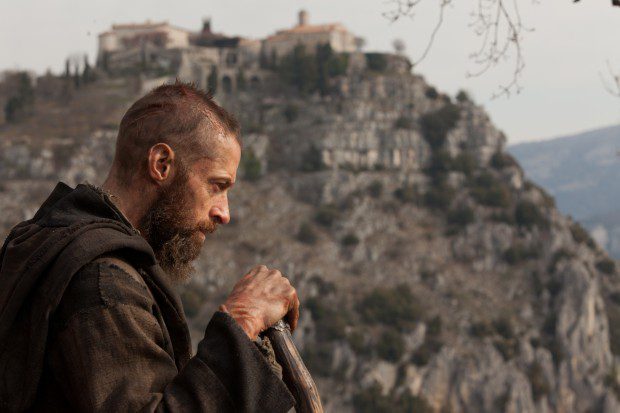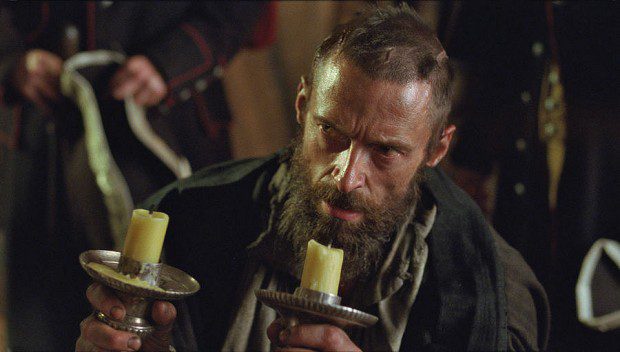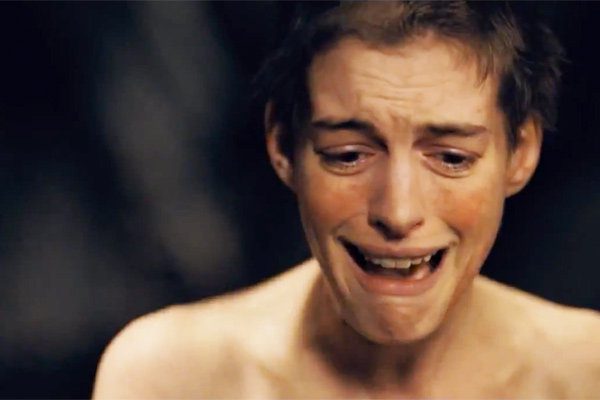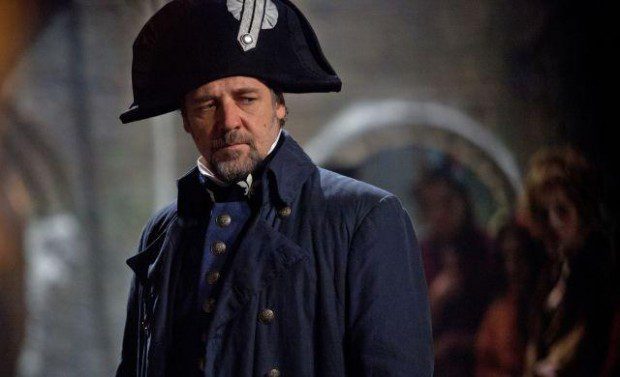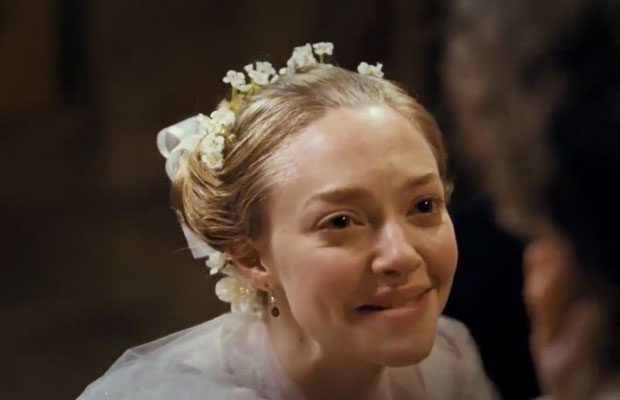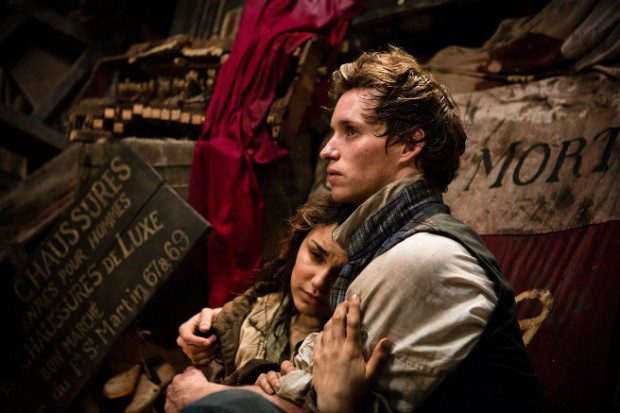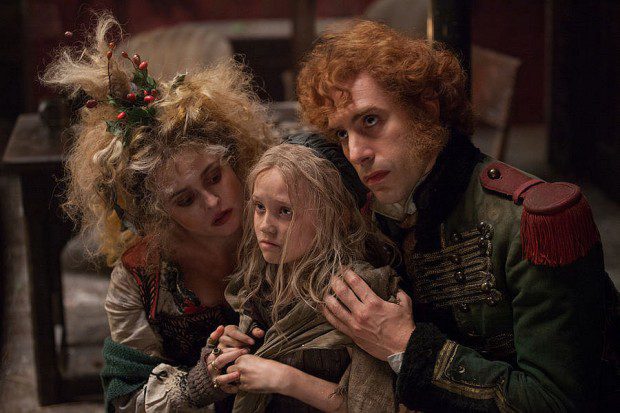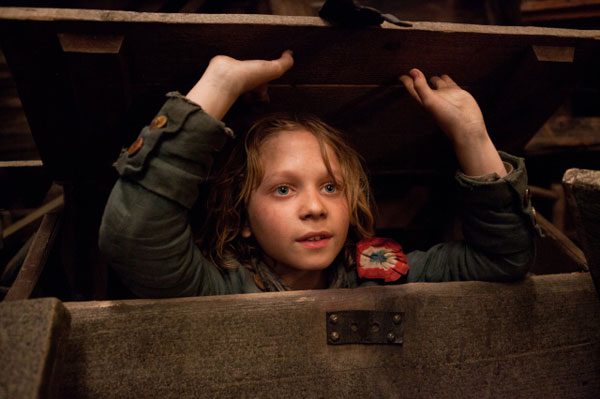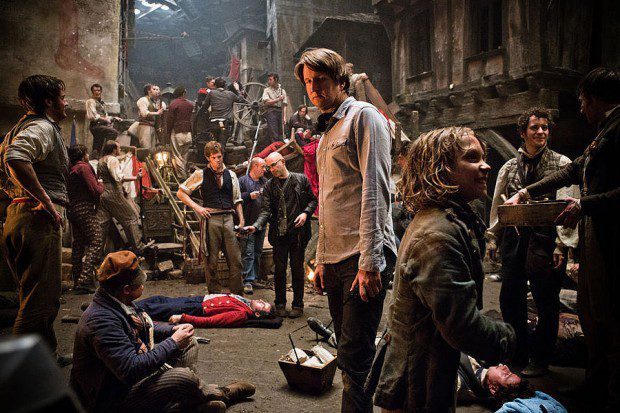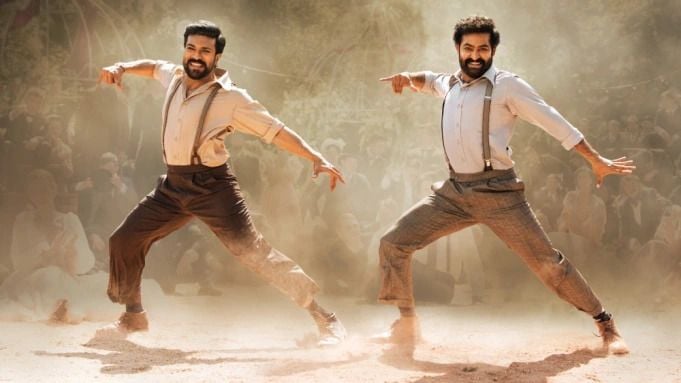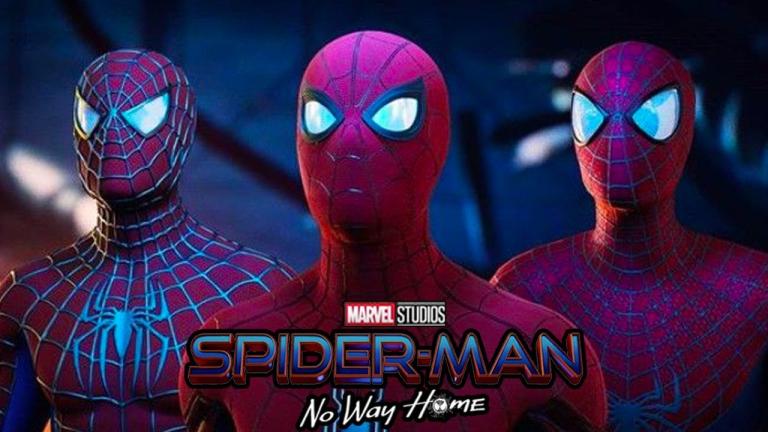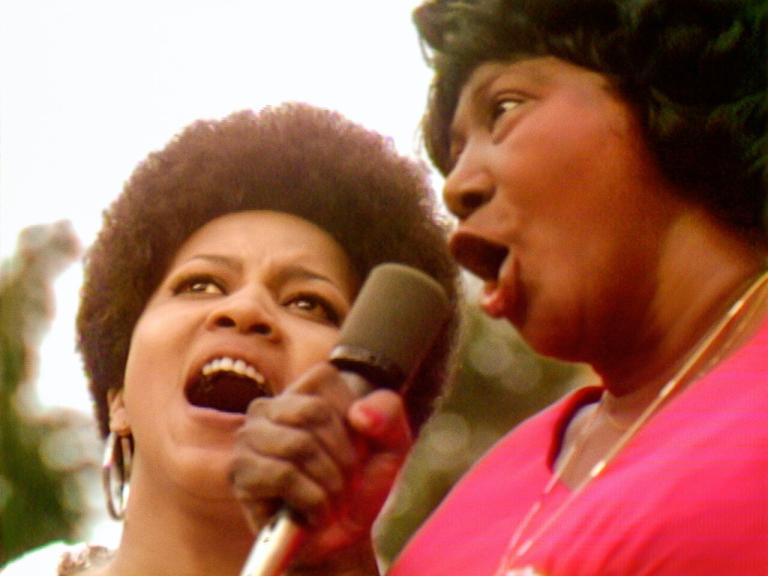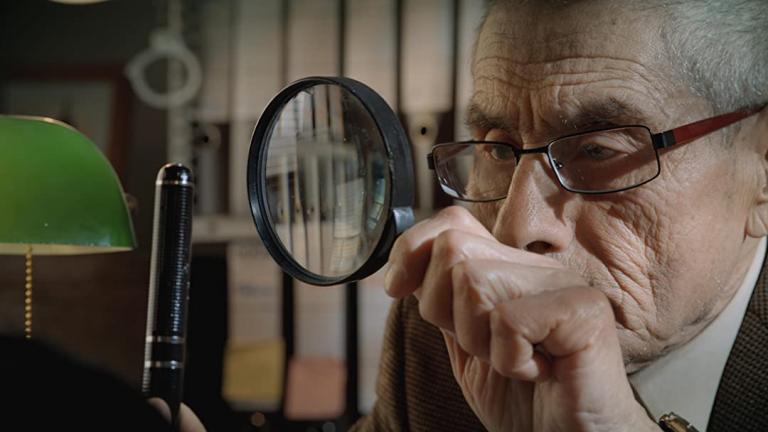Adapting a beloved novel to the big screen is a dicey undertaking. Bringing a rapturously remembered musical to the movies is even more risky. Following up an Oscar winning film is also fraught with danger. And yet, Tom Hooper expands his remarkably assured direction of The King’s Speech in the epic, poetic, and nearly overwrought Les Miserables. Opening on Christmas Day, Les Miserables embodies the Easter narrative—sacrifice, death and resurrection. It is about the eternal tension between upholding the law versus extending grace and forgiveness. Bring lots of Kleenex. Hooper gives each of his performers a BIG MOMENT laden with tears. It may not be perfect, but Les Miserables is the most Moving Picture of 2012.
Hugh Jackman brings such heart and soul to the role of Jean Valjean. His initial, emaciated appearance as a prisoner and thief is striking. But a radical encounter with a gracious Catholic bishop transforms Valjean into an agent of change. A pair of candlesticks become vibrant symbols of radical forgiveness. Valjean’s musical question, “What Have I Done?” is a stirring start to a movie fraught with emotion.
Anne Hathaway makes every moment of her limited screen time register. We are plunged into Fantine’s desperation and feel every bit of her lost love in “I Dreamed a Dream.” No cutaways or effects are needed to make Hathaway’s solo the most riveting five minutes of cinema this year. It is deliriously over-the-top, pushing all kinds of emotional buttons; manipulative but effective.
Unfortunately, Russell Crowe doesn’t fare as well as the by-the-book policeman, Javert. While his adopts an uptight persona, Crowe’s limited voice falls short during his solo on “Stars.” It is cool to see two manly men engaging in song battles, but Jackman’s musical chops are so superior to Crowe that they don’t feel like equals.
Amanda Seyfried also comes across as a bit too sleight as Valjean’s adopted daughter, Cosette. While her eyes are an amazing attribute, her voice and presence don’t rise to the same level as her co-stars Eddie Redmayne and Samantha Barks.
As Marius and Eponine, these young British actors make compelling characters who we root for throughout the almost three hour running time. Their quiet take on “A Little Fall of Rain” is one of the few understated moments in Les Mis. Less is sometimes more. American Aaron Tveit is also quite engaging as the leader of the resistance, challenging Paris to join the barricade. These emerging stars make revolution look so attractive.
Some have already criticized the intense close ups that Tom Hooper employs throughout Les Miserables. The camera shakes and quivers along with the actors. So many tears are shed onscreen that audiences may be tempted to check out. The strings and solos are all at a fever pitch throughout. But if you are willing to be swept up into the scope, the pageantry, and especially the pathos of Les Miserables, you are in for a deeply satisfying experience.
Victor Hugo found such vivid ways to portray compassion, forgiveness, and sacrifice. French composers Claude-Michel Schonberg and Alain Boublil tapped into Hugo’s gracious spirit for their rousing score. Believers will find so many points of recognition and contact. Cynics may find their hearts strangely warmed.
The most compelling performances in Les Miserables may come from the youngest performers. As young Cosette, Isabelle Allen conveys purity amidst corruption. It is refreshing to see a child actor who doesn’t seem jaded by years of show business cattle calls. As the exploitative Thenardiers, Helena Bonham Carter and Sasha Baron Cohen wear their debauchery as a comic badge of honor. Neither Carter nor Cohen can’t resist the urge to mug for the camera. A dose of these charlatans goes a long way. The most haunting performer may be Daniel Huttlestone as Gavroche, a boy revolutionary. At a time when our nation has been grieving over young lives shot down in Connecticut, it is eerie to see a child standing up to guns at the barricade.
Yet, Victor Hugo understood that injustice is always cruel towards the young and the innocent. Being poor is a travesty, especially when it is visited upon boys and girls. Les Miserables was written to expand our capacity for love and understanding. The songs wrench our emotions, leaving us pliable. Tom Hooper and his stellar cast hit so many high notes to bring us out of complacency. When Jean Valjean sings, “Bring Him Home,” we reflect back on all the soldiers who have lost their lives on the battle lines. Les Miserables is a universal prayer for peace, for justice, for equality. Many have perished in that struggle across time. The French Revolution was a long, drawn out fight inspired by American independence. And thousands of heroes like Jean Valjean poured blood, sweat, and tears into securing our freedom. This is a paean for more liberty and justice for all.
I was riveted by the tense storyline in Argo. I luxuriated in the visual splendor of Life of Pi. I marveled at the political acumen that fueled Lincoln. And I haven’t seen Zero Dark Thirty. But none of them approaches the emotional impact of Les Miserables. That doesn’t mean it will win the Oscars as Best Picture. But it will give audiences that elusive, old-fashioned feeling of being caught up in something bigger. It is a classic story, rooted in ancient truth, about what is worth fighting for. By the time the cast invites us to hear the people sing, to join the resistance, to usher in a world we long to see, we cannot wait for “When Tomorrow Comes.” Les Miserables offers a heavenly vision, where the virtuous are lifted up and saints like Jean Valjean receive their reward. In a weary era, such hard won hope is worth singing about.

